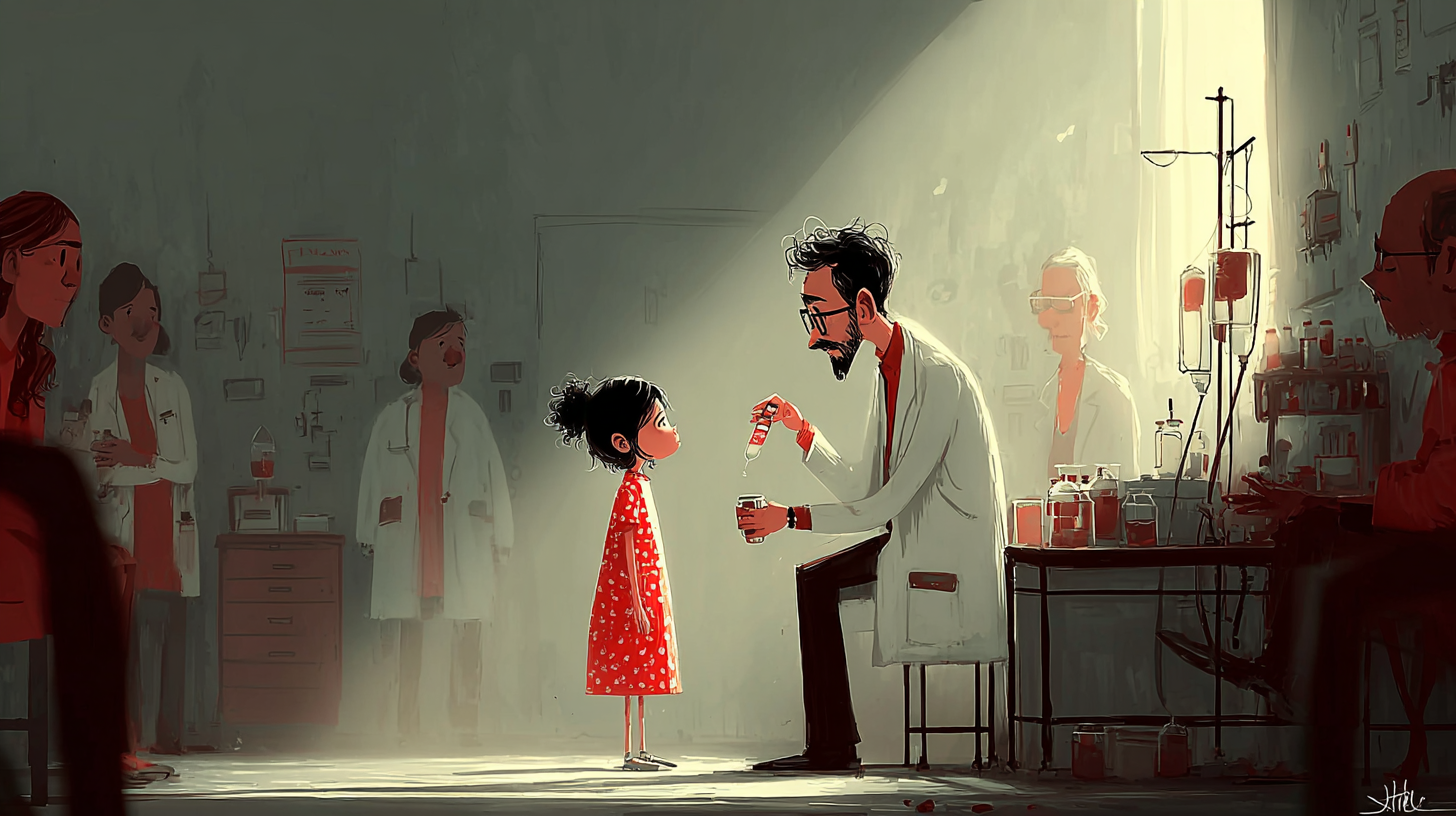Medicine means something that helps sick people feel better or the study of diseases.
病気を治すための薬や、病気を研究する学問のこと。
以下は英単語 “medicine” に関するストーリー型学習コンテンツです。まずは大枠の意味を理解して最後の文章で確認しましょう。
主な意味(main meaning)
| 品詞 | 意味 | 発音記号 (IPA) | 例文 |
|---|---|---|---|
| 名詞 | 病気を治したり予防する薬 | /ˈmedɪsɪn/ | The doctor gave me some medicine for my headache. |
| 名詞 | 医学(病気の研究や治療の学問) | /ˈmedɪsɪn/ | She is studying medicine at university. |
語源(etymology)
ラテン語 medicina(治すこと、癒すこと)から来ている。
核となるイメージは「治すための力」。
類義語(synonyms)
| 類義語 | 意味 | 例文 |
|---|---|---|
| drug | 薬(一般的な薬) | This drug is very effective for colds. |
| remedy | 治療法、薬 | Honey is a natural remedy for a sore throat. |
| treatment | 治療 | The new treatment helped many patients recover. |
| cure | 治療、治すこと | Scientists are looking for a cure for cancer. |
反義語(antonyms)
| 反義語 | 意味 | 例文 |
|---|---|---|
| disease | 病気 | The disease spread quickly in the village. |
| poison | 毒 | The bottle contained poison, not medicine. |
コロケーション(collocations)
| コロケーション | 例文 |
|---|---|
| take medicine | You should take medicine after meals. |
| practice medicine | He wants to practice medicine in his hometown. |
| traditional medicine | Many people still use traditional medicine. |
| prescribe medicine | The doctor will prescribe medicine for your condition. |
2項表現(binomials)
| 2項表現 | 例文 |
|---|---|
| medicine and health | The lecture was about medicine and health. |
| doctors and medicine | She has been interested in doctors and medicine since childhood. |
英語ストーリー(english story)
Mr. Brown was a young doctor who had just started working at a small hospital in his hometown. He had always wanted to study medicine because he believed it could help people live longer and healthier lives. At university, he spent years learning about different diseases and the best treatment for each one.
One morning, a little girl named Anna came to the hospital with her mother. She had a high fever and was coughing badly. Mr. Brown examined her carefully and explained that she had the flu. He decided to prescribe medicine to help her recover quickly. He said kindly, “Anna, you need to take medicine three times a day after meals.”
Anna looked worried and asked, “Will it taste bad?” Mr. Brown smiled and replied, “Maybe a little, but remember, this drug will make you feel much better soon.” Her mother thanked the doctor and said she was happy to find such a good remedy.
Later that day, Mr. Brown gave a lecture to young students about medicine and health. He explained that modern medicine is very powerful, but people should not forget the value of traditional medicine, such as natural herbs and healthy food. “Doctors and medicine can help us,” he said, “but prevention is also important. A good lifestyle is sometimes the best cure.”
At the end of his lecture, a student asked, “Doctor, if medicine is so strong, why do people still suffer from many diseases?” Mr. Brown answered thoughtfully, “Because medicine is not magic. We still have much to learn. But every day, scientists are working hard to find better treatments and maybe one day, even a cure for serious illnesses.”
The students clapped, feeling inspired. Mr. Brown went home that evening, proud to be practicing medicine and hopeful that the future would bring even greater discoveries.
和訳
ブラウン先生は、地元の小さな病院で働き始めたばかりの若い医者でした。彼はずっと**medicine(医学・薬)を学びたいと思っていました。人々が長く健康に生きられるように助けたいと信じていたからです。大学では、さまざまなdisease(病気)や、それぞれに合った最良のtreatment(治療)**について長年学びました。
ある朝、アンナという小さな女の子が母親と一緒に病院に来ました。彼女は高熱があり、ひどく咳をしていました。ブラウン先生は丁寧に診察し、インフルエンザだと説明しました。そして早く治るように**prescribe medicine(薬を処方する)ことにしました。「アンナ、食後に1日3回、このmedicine(薬)**を飲まないといけません」と優しく言いました。
アンナは心配そうに「味はまずいの?」と聞きました。先生は笑顔で「少しはね。でもこの**drug(薬)がすぐに元気にしてくれるよ」と答えました。母親は「よいremedy(治療法・薬)**を見つけられて安心しました」と先生に感謝しました。
その日の午後、ブラウン先生は学生たちに「medicine and health(医学と健康)」について講義をしました。現代の**medicine(医学)はとても力強いが、人々はtraditional medicine(伝統医学)**の価値も忘れてはいけないと説明しました。「**Doctors and medicine(医者と医学)は私たちを助けてくれるけれど、予防も大切です。健康的な生活が時に最高のcure(治療)**になるのです」と語りました。
講義の終わりに学生が「先生、もし**medicine(医学)がそんなに強いなら、なぜまだ多くのdisease(病気)で苦しむ人がいるのですか?」と尋ねました。先生は考えながら答えました。「医学は魔法ではありません。まだ学ぶことがたくさんあります。でも毎日、科学者たちはより良いtreatment(治療)を見つけ、いつか大きな病気のcure(治療法)**を発見するかもしれません。」
学生たちは拍手を送り、勇気づけられました。ブラウン先生はその夜、**practice medicine(医者として働くこと)**を誇りに思い、未来にさらなる発見があることを願いながら帰宅しました。
Q&A
Q: “medicine”と“drug”の違いは何ですか?
A: “medicine”は病気を治すために使う薬全般を指します。“drug”は薬ですが、医薬品以外に「薬物」の意味もあります。
Q: “remedy”は“medicine”と同じ意味ですか?
A: 似ていますが、“remedy”は薬だけでなく自然療法や方法も含みます。
Q: “treatment”と“cure”の違いは?
A: “treatment”は治療の過程や方法を指し、“cure”は完全に治ることを意味します。
Q: “practice medicine”はどういう意味ですか?
A: 医者として働くこと、つまり医学を実際に行うことを意味します。
Q: “traditional medicine”とは何ですか?
A: 西洋医学ではなく、漢方やハーブなど昔から使われてきた医学のことです。



コメント